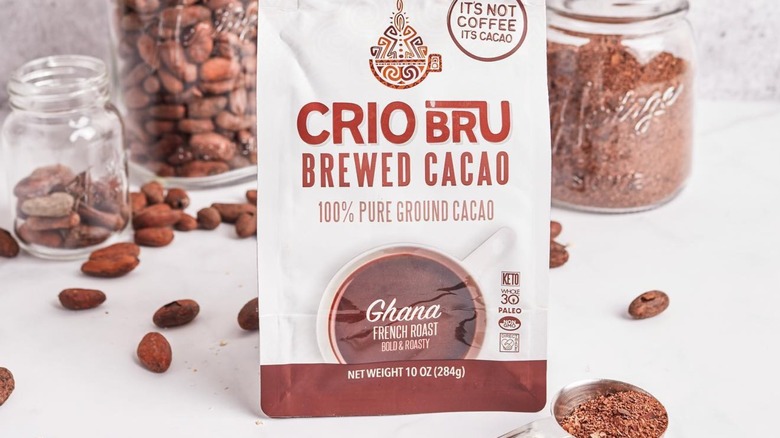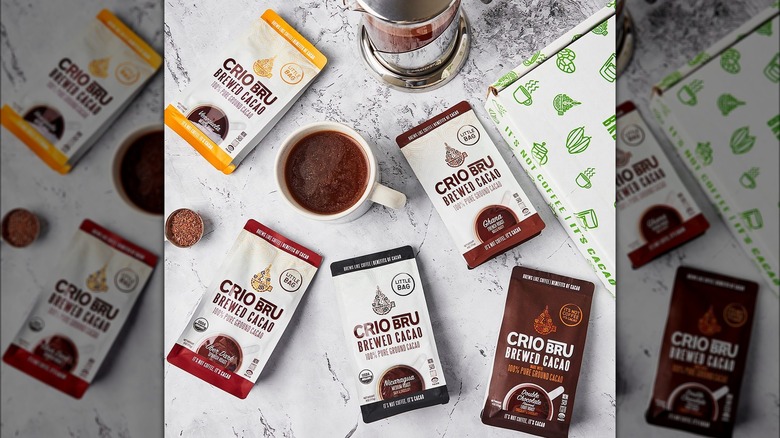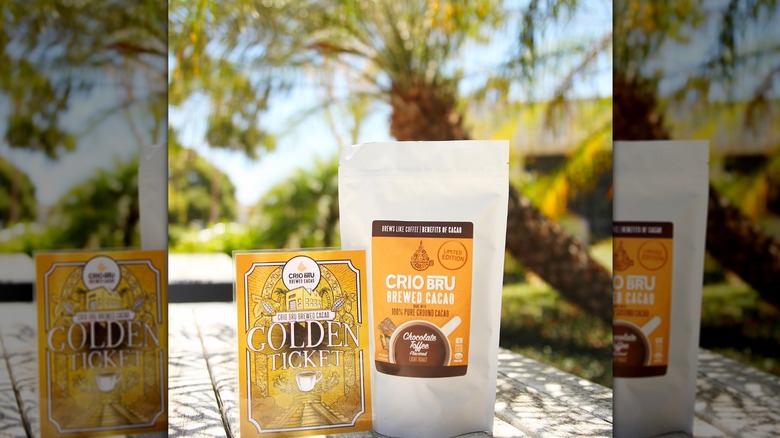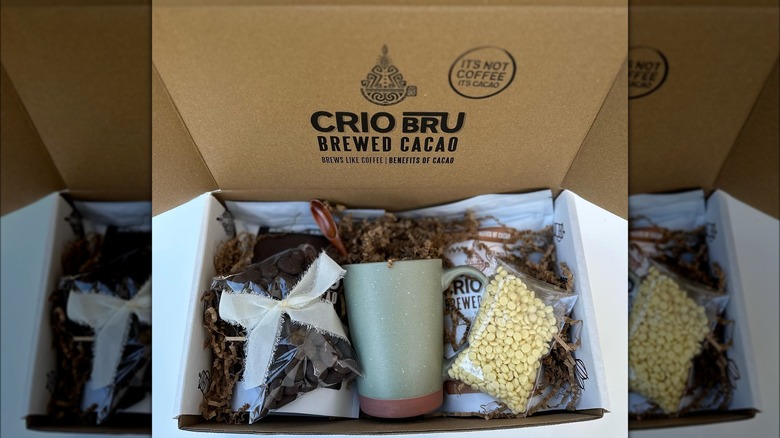Here's What Happened To Crio Bru Cacao After Shark Tank
Entrepreneurs Jon Fotheringham and Dr. Eric Durtschi named Crio Bru Cacao after the Criollo cacao bean, a rare variety that was thought to have originated in Amazonas, Peru. Valued for its lack of bitterness and sweet and fruity fragrance, the bean is one of the most difficult to develop and grow and comprises only about 2% of global cacao bean production. But despite the drink being brewed like coffee and made from the same kind of beans used to make chocolate, Crio Bru Cacao tastes like neither coffee nor hot chocolate, but rather has its own distinct flavor. Made from unsweetened cacao beans, it's 99.9% caffeine-free and contains theobromine, a natural source of energy.
When Fotheringham and Durtschi brought their "Drink of the Gods" onto Season 5, Episode 26 of "Shark Tank" in 2014, they likely expected a much different reception than the one they received. Described as a combination of coffee and chocolate, most of the Sharks appeared very interested in Crio Bru Cacao, especially after they heard that the drink had more antioxidants than blueberries. But that all changed after taking a sip. With the exception of Barbara Corcoran, none of the Sharks liked the taste of the drink. Before even hearing the pair's financial facts, Daymond John, Robert Herjavec, and Mark Cuban were already out.
How Crio Bru fared on Shark Tank
Jon Fotheringham and Dr. Eric Durtschi appeared very confident when they introduced themselves on "Shark Tank" seeking $1 million in exchange for a 10% stake in Crio Bru Cacao. Fotheringham explained that the drink's history goes back thousands of years to the Mayans, who called it xocoatl, or the drink of the Gods. Durtschi claimed he spent years trying to get the formulation for the drink just right, and that others had been attempting the same thing for the past 150 years.
When it came time to try the drink, Robert Herjavec said, "I don't like the taste of that." Mark Cuban was the first to bow out, telling them, "Not a fan, guys, I'm out," followed by Herjavec's "Not for me, I'm out." Next was Daymond John, who was more blunt about his feelings: "It really is horrible, I'm out." Kevin O'Leary, who had been skeptical from the start, suggests their pitch is the shortest in the show's history before asking them to explain why they're worth $10 million. When Durtschi admits they only made $150,000 that year, O'Leary calls them out on evaluating their company for 100 times their profit.
Everyone looks at Barbara Corcoran, the last Shark standing, who tells them, "I think you're screwed, I'm out." She apologizes and tells them their mistake was giving the wrong valuation. As the Sharks argue about whether they could've been more supportive, Fotheringham and Durtschi leave without a deal.
After the Shark Tank bump
Even though they left without any investors, Eric Durtschi forged on, certain that they had something special with Crio Bru Cacao. The company's business also flourished after appearing on "Shark Tank," which helped. "In the hour after the show aired we had almost a month's worth of sales," Eric Durtschi told ABC4's "Good Things Utah" about the effect "Shark Tank" had on Crio Bru Cacao's sales. He acknowledged that "the Sharks weren't our biggest fans, but you can't beat getting national publicity."
Unfortunately, Jon Fotheringham left the company before the "Shark Tank" episode even aired, with his LinkedIn page showing that his tenure as the company's CEO lasted from October 2010 to December 2013. He is currently the Principal Global Business Transformation Manager for Adobe.
Two years after Crio Bru Cacao's episode aired, the company was still expanding and finding new outlets to sell its product. According to a February 2016 press release, the company went on to obtain an investment from the Santa Barbara-based Esperer Holdings, and was planning to open a production facility there. It also signed a deal with Sprouts Farmers Market to sell the cacao bean drink in over 200 stores across 13 states. That same year, the company began selling its products in Sam's Club and introduced a new beverage, Crio Bru Chuno, made from Nicaraguan cacao beans. Crio Bru Cacao's growth was happening quickly and had no intention of slowing down.
Crio Bru has become a favorite coffee alternative
Crio Bru Cacao has continuously added more selections and varieties from different countries. The products offered on its website include cacao bean roasts from Ghana, Ecuador, Nicaragua, and Venezuela. It also regularly switches up its seasonal and limited edition flavors, with Caramel, Maple, and Pumpkin Spice currently being offered. The company has also taken the brewing process into its own hands, offering Stovetop Espresso Makers, French Presses, and Coffee Maker Baskets in gift packs with its cacao blends.
In addition to having over 42,000 followers on Instagram, Crio Bru Cacao has also appeared in lists for the best coffee alternatives, showing up in National Geographic, The Daily Beast, and even Today's Parent. Over the years the company has also gotten support from celebrities like Jane Lynch, Queen Latifah, and Mayim Bialik, who have appeared in photos with the product.
But the biggest thing that Crio Bru does is give away yearly "Golden Tickets" to its customers. The ticket, which shoppers can randomly win after purchasing a product, gives the winner a free trip to Santa Barbara, California, complete with airfare for two, a two-night hotel stay, a one-hour cacao class, and a tour of the Crio Bru Brewed Cacao production facility.
The company hopes the future holds even more cacao bean products
In 2021 Eric Durtschi talked about cacao in a meeting with the Orange County California Rare Fruit Growers and also revealed what he hoped Crio Bru Cacao could offer in the future. "Right now I have a partner who has a plant in Ecuador, and we're trying to freeze-dry [the cacao beans]," he said. He also remarked that he's working on making cacao-sweetened energy drinks. "If you cold brew certain beans from certain regions, you actually have a very fruity type taste instead of chocolatey," he explained.
Durtschi is very hands-on with the farmers he works with as well as the cacao beans used in Crio Bru's drinks, and has experimented with different strains on his own. He comes across in interviews as someone who's not interested in just sticking to what he knows people like, but wants to use his creativity and chocolate skills to make new and unique drinks that haven't been done before. As long as Durtschi remains president of Crio Bru, it seems that the company will continue to surprise devoted customers as well as first-timers with new flavors, varieties, and innovative ways to get their cacao bean fix.




